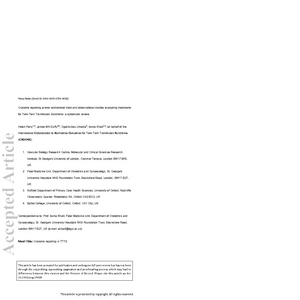Perry, H; Duffy, JMN; Umadia, O; Khalil, A; International Collaboration to Harmonise Outcomes for Twin-Twin
(2018)
Outcome reporting across randomized trials and observational studies evaluating treatments for twin–twin transfusion syndrome: systematic review.
Ultrasound Obstet Gynecol, 52 (5).
pp. 577-585.
ISSN 1469-0705
https://doi.org/10.1002/uog.19068
SGUL Authors: Khalil, Asma
![[img]](https://openaccess.sgul.ac.uk/109729/1.hassmallThumbnailVersion/Perry_et_al-2017-Ultrasound_in_Obstetrics_%2526_Gynecology.pdf)  Preview |
|
PDF
Accepted Version
Available under License ["licenses_description_publisher" not defined].
Download (2MB)
| Preview
|
Abstract
Objective
Twin–twin transfusion syndrome (TTTS) is associated with significant mortality and morbidity. Potential treatments for the condition require robust evaluation. The aim of this study was to evaluate outcome reporting across observational studies and randomized controlled trials assessing treatments for TTTS.
Methods
Cochrane Central Register of Controlled Trials, EMBASE and MEDLINE were searched from inception to August 2016. Observational studies and randomized controlled trials reporting outcome following treatment for TTTS in monochorionic–diamniotic twin pregnancy and monochorionic–triamniotic or dichorionic–triamniotic triplet pregnancy were included. Outcome reporting was systematically extracted and categorized.
Results
Six randomized trials and 94 observational studies were included, reporting data from 20 071 maternal participants and 3199 children. Six different treatments were evaluated. Included studies reported 62 different outcomes, including six fetal, seven offspring mortality, 25 neonatal, six early childhood and 18 maternal/operative outcomes. Outcomes were reported inconsistently across trials. For example, when considering offspring mortality, 31 (31%) studies reported live birth, 31 (31%) reported intrauterine death, 49 (49%) reported neonatal mortality and 17 (17%) reported perinatal mortality. Four (4%) studies reported respiratory distress syndrome. Only 19 (19%) studies were designed for long‐term follow‐up and 11 (11%) of these reported cerebral palsy.
Conclusions
Studies evaluating treatments for TTTS have often neglected to report clinically important outcomes, especially neonatal morbidity outcomes, and most are not designed for long‐term follow‐up. The development of a core outcome set could help standardize outcome collection and reporting in TTTS studies. Copyright © 2018 ISUOG. Published by John Wiley & Sons Ltd.
| Item Type: |
Article
|
| Additional Information: |
This is the peer reviewed version of the following article: Perry, H. , Duffy, J. M., Umadia, O. , Khalil, A. and , (2018), Outcome reporting across randomized trials and observational studies evaluating treatments for twin–twin transfusion syndrome: systematic review. Ultrasound Obstet Gynecol, 52: 577-585., which has been published in final form at https://doi.org/10.1002/uog.19068. This article may be used for non-commercial purposes in accordance with Wiley Terms and Conditions for Self-Archiving. |
| Keywords: |
Obstetrics & Reproductive Medicine, 1114 Paediatrics And Reproductive Medicine |
| SGUL Research Institute / Research Centre: |
Academic Structure > Molecular and Clinical Sciences Research Institute (MCS) |
| Journal or Publication Title: |
Ultrasound Obstet Gynecol |
| ISSN: |
1469-0705 |
| Language: |
eng |
| Publisher License: |
Publisher's own licence |
| PubMed ID: |
29607558 |
| Dates: |
| Date |
Event |
| 2018-11-05 |
Published |
| 2018-09-24 |
Published Online |
| 2018-03-27 |
Accepted |
|
 |
Go to PubMed abstract |
| URI: |
https://openaccess.sgul.ac.uk/id/eprint/109729 |
| Publisher's version: |
https://doi.org/10.1002/uog.19068 |
Statistics
Item downloaded times since 12 Apr 2018.
Actions (login required)
 |
Edit Item |



